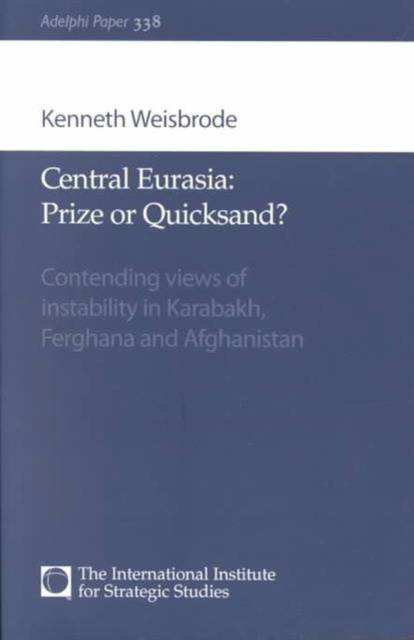
Door een staking bij bpost kan je online bestelling op dit moment iets langer onderweg zijn dan voorzien. Dringend iets nodig? Onze winkels ontvangen jou met open armen!
- Afhalen na 1 uur in een winkel met voorraad
- Gratis thuislevering in België vanaf € 30
- Ruim aanbod met 7 miljoen producten
Door een staking bij bpost kan je online bestelling op dit moment iets langer onderweg zijn dan voorzien. Dringend iets nodig? Onze winkels ontvangen jou met open armen!
- Afhalen na 1 uur in een winkel met voorraad
- Gratis thuislevering in België vanaf € 30
- Ruim aanbod met 7 miljoen producten
Zoeken
Central Eurasia - Prize or Quicksand?
Contending Views of Instability in Karabakh, Ferghana and Afghanistan
Kenneth Weisbrode
€ 32,45
+ 64 punten
Omschrijving
This paper argues that the major powers have played a central role in fomenting a logic of regional rivalry that has prevented Central Eurasia from developing the critical foundations of co-operation that are necessary to produce the kind of post-Soviet stability one finds in Europe. While the paper does not dismiss the many internal causes of instability, it chooses to focus on the significance of the region to outside powers and the role those powers have played, both on the ground and in the symbolic realm. It does so by tracing the involvement of major powers in three particularly rich areas of instability - Karabakh, Ferghana and Afghanistan. Each case illustrates divergences between rhetorical policy and actual interests, and shows how the former have hindered the latter.
Specificaties
Betrokkenen
- Auteur(s):
- Uitgeverij:
Inhoud
- Aantal bladzijden:
- 120
- Taal:
- Engels
- Reeks:
Eigenschappen
- Productcode (EAN):
- 9780198510703
- Verschijningsdatum:
- 30/09/2000
- Uitvoering:
- Paperback
- Formaat:
- Trade paperback (VS)
- Afmetingen:
- 168 mm x 226 mm
- Gewicht:
- 140 g

Alleen bij Standaard Boekhandel
+ 64 punten op je klantenkaart van Standaard Boekhandel
Beoordelingen
We publiceren alleen reviews die voldoen aan de voorwaarden voor reviews. Bekijk onze voorwaarden voor reviews.











